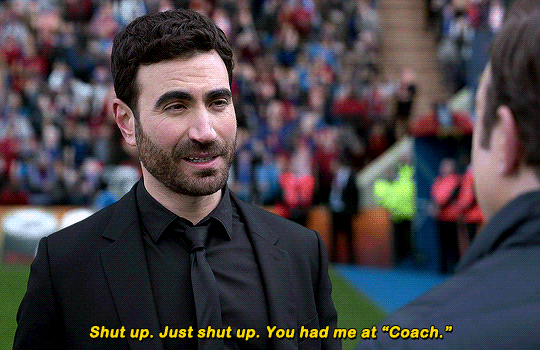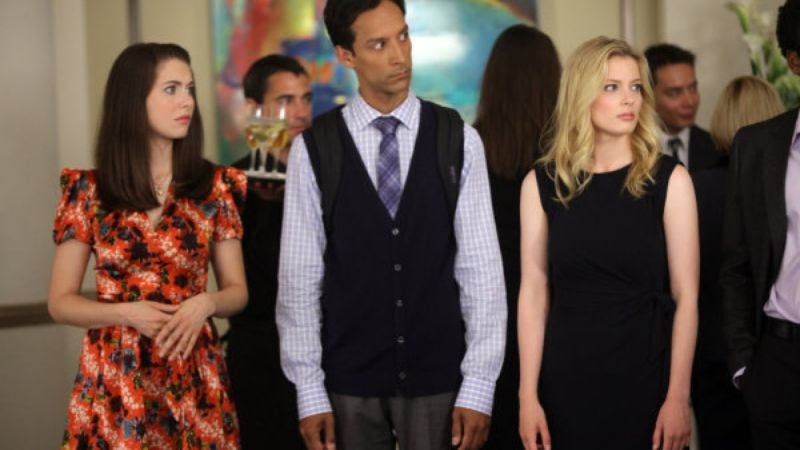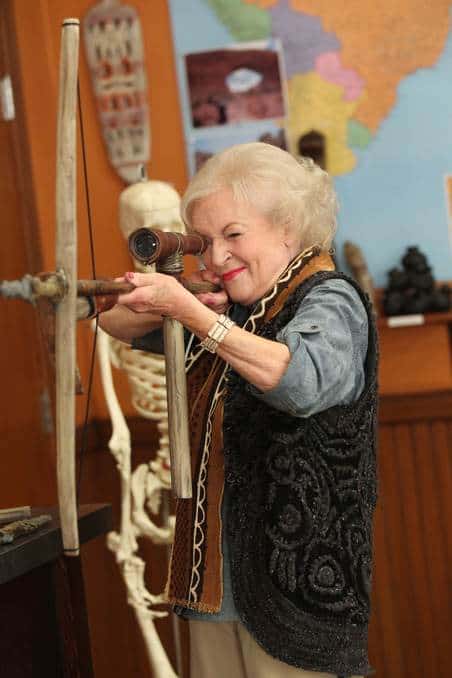"Messianic Myths and Ancient Peoples"
Original Airdate: October 21, 2010
One of the best comedies of all time (if not the best) in my humble opinion is a little show that used to be on NBC called Friends. And, apart from the sheer hilarity of the situations the group managed to find themselves in, the one thing that I really love to this day about the show is the bond that each main character has with the other characters. Everyone is quick to remember the Ross/Rachel or Joey/Chandler dynamics, but the true gems of the show’s stories (in my opinion) were when the audience had the opportunity to watch other pairings unfold – “The One With All the Cheesecakes” was an episode that was centered around Rachel/Chandler – a pairing the audience didn’t frequently see together in many episodes. And what’s special and wonderful about these plotlines are that they remind the audience that, while the six main characters of the show function as a unit, when broken down into individual components or even pairings, the significance and importance of those moments is highlighted. Because the bottom line is that these people (both the characters in Friends and the ones in Community) are friends and some friendships will always be closer (see: Joey/Chandler, Troy/Abed) than others (see: Ross/Phoebe, Shirley/Abed), but not less important. The beauty of these less-publicized (as I’ll call it) pairings is that, when the audience sees them, it’s something fresh, unexpected, and – most importantly – allows viewers to recognize the significance of the lesser frequented pairings. So what’s the significance of “Messianic Myths and Ancient Peoples”? It’s not an episode that people generally declare as a “go-to” Community episode, but it’s one that I think is very intriguing and heartwarming because of the Shirley/Abed storyline. So I’ll spend the majority of my time today discussing them, why I feel their relationship is so important, why – as characters – they are each important, and who knows, maybe I’ll discuss Leonard and the Hipsters (which sounds like the name of a less-ironic and unoriginal hipster band).
So let's talk about the plot for the episode then, shall we? We open the episode with the gang in Anthropology class. They're watching viral videos on the Internet and... well, not doing much learning of anything related to their subject of study. While everyone else seems to find the videos hilarious, Shirley doesn't. I think that it’s interesting (and a bit sad for Shirley) that no one seems to respect her in the class. And I know that she’s supposed to have her religion played for jokes but Troy’s line (“What happens if you type in God?” “Everyone hates you and wants you to shut up”) and Abed’s (“You asked for it!” in reference to the God of Farts video) line are particularly harsh, but primarily because they are lines that would seemingly be directed at Britta. In “Comparative Religion,” Shirley displayed her controlling tendencies in regards to her faith and beliefs. At this point in season two, she has come quite a way from those antics, and even though her behavior may be annoying or irritating, I’m just intrigued by the fact that it was as attacked as it was. But perhaps I’m just reading too far into things. And I think that Shirley’s method of operation (and we’ll return to this throughout the episode in regards to both her and Abed) is to become defensive when someone attacks or belittles her belief system. She takes action throughout the episode, whether or not that action is rooted in justifiable or selfish causes.
Everyone, even Jeff and Annie, are suggesting absurd videos for Professor Dunan to search. It’s amusing to see someone like Jeff actually relax in class and not slouch into “too-cool-to-pretend” mode and for someone like Annie to loosen up from her tightly wound, obsessively studious ways in this episode. And, even though they aren’t in it much, it shows a bit of character development for each of them, even if the development is seemingly insignificant and a tad silly. Shirley asks who would want to watch offensive videos like the ones they are watching, and Duncan replies with: "17 million people." The mother, visibly distraught, explains that there were nine people at her church the previous night. When Shirley makes the statement about how many people attended her church, it’d be easy for me to mistake her statement as guilt-inducing, but I really don’t think that it is. I genuinely think that she was upset by the fact that her belief system and her faith – these things that are so fundamental to her, that she’s built her life on – are so unimportant to EVERYONE around her. And for the briefest of moments, Jeff and Britta (and Troy and Abed) feel momentary flickers of regret and maybe even sympathy… which are quickly forgotten when they view the next YouTube obsession.
Shirley decides to enlist the help of Abed in creating a viral video that will send a positive message to young people. I think it’s adorable that Shirley approaches Abed about making a religious film. We, as audience members, usually understand fairly well that these two characters are externally different. But, as I have said numerous times before, it’s amazing how fundamentally similar both Abed and Shirley are. Both seek some form of acceptance and approval among other people, whether or not they admit it. But – and this is significant – the major similarity between Shirley and Abed is that both have a desire to control people and circumstances. Remember what I noted in “Anthropology 101”? The reason that Shirley and Abed are just as much to blame for the dissention within the group during that episode as Jeff, Britta, and Annie are is because of control. Abed was so insistent on controlling the outcome of their year and Shirley on the outcome of Jeff and Britta’s relationship that both managed to lose sight of the fact that their actions were inevitably leading (in part) to the group’s blow-out. So maybe, just maybe, Shirley and Abed aren't as dissimilar as it would appear on the surface.
In line in the cafeteria, Pierce attempts to order macaroni and cheese, but Abed stops him and calls Britta over. The blonde insists that Pierce order vegetables as well. So our B-plot centers around Pierce and his new “hipster” friends (a group of old people with hip replacements, headed by Leonard). And I think that this episode provides a nice contrast to what will happen later on in Pierce’s seasonal story arc. Pierce is not someone who was born evil or uncompassionate. He, like many characters on the show, is backward in his way of thinking. And Pierce needs the group – he needs them just as much as Jeff and Abed do, and the study group needs him more than they actually are able to express. I think that, for a lot of the members, at least, they need someone to NEED. They want to take care of Pierce and look out for him (as Britta does in this episode) because he is family to them, and that’s just what families do. I really do think that the storyline is a nice way to set up contrast as to what Pierce is like with the study group and what he could become if he was left alone. Leonard (while a clearly amazing and hilarious character on the show and nearly everyone’s favorite recurring figure) doesn’t have family or friends. He has the “hipsters,” of course, but later on in the episode, it becomes clear that they aren’t true friends. Pierce actually DOES become like Leonard later on in the season, however – at the very end of “Early 21st Century Romanticism” we see that he is left alone, family and friend-less on a park bench because that is the path he chose in that moment. But he doesn’t have to be like Leonard because he has the study group – because, as Jeff explained to him in the first season, “when you have friends, you have family.” And maybe the grass seems greener on the other side without rules and without the confinements of his social circle, but it’s probably not.
I think the bottom line for our B-story is that Pierce feels the need to be accepted. But moreover than that, he needs to feel like he is somehow contributing to the group. And I think that, as much as he needs to be around the study group, he sometimes feels like he isn’t wanted or needed. Britta attempted to humor him in “Debate 109” in order to make him feel like he was doing something right. Pierce decides to ditch the study group for the remainder of the episode and hang out with the "cool" hipsters, taking on their rebellious attitude (but only to a certain extent). Meanwhile, Jeff and Annie watch how Pierce begins to act out, and Annie claims that Jeff is the "dad" of the group, so he has to do something about the elderly man's behavior. Jeff insists that he does not, and this role of father-figure to the group will come back around at the end of the episode and intrigues me, especially in light of Jeff's own father issues.
Abed finds Shirley in the library and agrees to do the religious film for her, because he read the whole New Testament and was intrigued by the character of Jesus, comparing him to Edward Scissorhands and Marty McFly. Shirley is initially thrilled... until Abed begins to explain the concept of his movie to her. It's a meta film, he explains, and one that will be titled "ABED" (in all caps). One interesting thing to note in regards to both Shirley and Abed’s characters is an issue of pride. And pride, like I’m sure I have said before, isn’t a word that should always have a negative connotation associated with it. Pride in your work and pride in yourself within limits is healthy. However, this episode explores Abed’s pride. Originally, Shirley discussed the prospect of working with Abed on a film and the student agreed. In the library, however, Abed declared that the film would be “[his] masterpiece.” Very quickly, he’s abandoned all pretense of helping a friend and instead sets out to makes HIS name known. And Shirley, rather than becoming condescending or lecturing Abed right off the bat, decides to walk away.
Shirley then decides to recruit (or, more likely, guilt-trip) both Britta and Troy into helping her film her viral video. (As you can probably tell, the two are just thrilled to be participating in a rapping Jesus YouTube video.) However, before Shirley can get through the video, there is a loud crash outside. As it turns out, Abed is filming the movie that he intended to start for Shirley. There is just one tiny thing that Shirley disagrees with in regards to the film, however -- Abed portrays himself as Jesus and, in a very meta film, claims to be him. Now, Abed is the kind of person who, in spite of claiming in the first season that he had copious amounts of self-esteem, still thrives on feelings of acceptance and desires to be understood. We learn early on in the series that Abed’s films allow him to feel that way – to connect to people who he would otherwise be unable to form an emotional attachment with. And even though the group has managed to be the support that Abed needs the majority of the time, he often resorts to his fallback – controlling and manipulating – in order to establish himself in their lives. Because (flashing forward to an episode like “Virtual Systems Analysis”) if Abed isn’t able to control people and circumstances, what role does he have in the group at all? (Remember: this is how Abed perceives himself.)
Shirley’s desire from the beginning of the episode was to connect in some way, shape, or form the existing media and deliver her intended message. Abed’s desire, I believe, was to establish himself – his career, his status, etc. – and those visions clash as the episode wears on. But there is also an undertone to the reasons why Shirley acts the way that she does. Part of her reactions stem from righteous indignation and accusations of blasphemy. But another part (a part that Abed cannot come to grips with until the end of the episode), a larger part, is trying to save Abed from himself. And in a way, Shirley’s behavior throughout the episode provides better insight into the “light” of the message that she wanted to send than any YouTube video could. Abed sacrificed his movie so that he would not be a laughingstock. Shirley sacrificed her pride and status in order to save a friend.
The mother slowly grows more irritated with Abed's behavior as the episode wears on, evolving from mere concern and worry to full-on anger at the end. Similarly, Pierce's behavior begins to evolve as the episode wears on -- he begins to become more and more rebellious and resentful of the group's babying in regards to his behavior. Jeff begins to lecture the study group and Pierce before stopping himself -- with a newspaper in hand and a lecture coming out of his mouth, he's beginning to feel like too much of a father to the elderly man and he doesn't like that. Pierce storms out of the study group in response, and Shirley affirms to Abed that she's going to shut his meta production down because his claims to be Jesus and his delusions as a filmmaker have clouded his better judgement.
Later on, Shirley arrives on the set of Abed's movie to do just that -- with a complaint filed to the dean invoking the separation of church and state, she declares the production be shut down for good. And clearly, Abed’s ego has already hit a high point when he tells those involved in his film that they have contributed in a “small” way to the greatest film ever made. Shirley’s anger has overtaken her by this point in time (remember that she has thinly veiled rage issues?), but I believe there is a part of her that is still concerned for Abed’s well-being and not just bitter and upset.
Outside, Pierce and the hipsters go for a joy ride in Dean Pelton's car. But when one of the hipsters, Richard, "crashes" into a curb, everyone else bails out of the car. Leonard claims that it's "every man for himself," which leaves Pierce alone with Richard. This is the one scene of importance to note between Pierce and the hipsters. Pierce recognizes that friends – true friends – won’t leave you, even when you’re being irrational, even when you’re wrong and completely unbearable. True friends, he realizes, are probably the people HE decided to leave earlier in the episode because he wanted to be rebellious.
Back in the cafeteria, Starburns is replaying some of the footage to Abed from his film. The student merely watches the scenes before leaving the cafeteria and heading outside into the courtyard. Abed then looks up at the sky and begins to pray to God to take the movie away from him. Abed’s moment of vulnerability is one that is extremely touching because he recognizes his mistake in his self-indulgence. He recognizes that he placed the emphasis of the project only on himself and deserves the punishment he’ll have to pay for it. It’s a step in the right direction for Abed, and something easy to gloss over the significance of. Abed decides to hand over the reins of his career to a God he’s praying to because he feels like that’s what he deserves for being selfish. (Again, Abed can be very self-deprecating at times – see: “Virtual Systems Analysis”) And overhearing him in the garden was Shirley, a person who willingly sacrifices her social status for Abed’s sake. Shirley then walks away from overhearing the conversation, and Abed assumes that since no meteor appeared or no lightning storm destroyed the set of his film, God was allowing this to be his punishment for being selfish. But just as it seems that his prayers have not been answered, Shirley appears on set, wielding a baseball bat and destroying the cameras.
At the front office, Pierce and the other hipsters were caught for joy riding in the dean's car and are being held in a room together. Jeff, apparently, is Pierce's emergency contact and arrives, requesting to be removed as his contact. When he looks into the room and sees Leonard and the others, he asks if anyone would be coming to get them. The woman at the desk says that Leonard's family has requested that the school stop calling them. No one, as it turns out, wants to come and pick up the elderly man. And I’d like to think that Jeff bailing Pierce out had a lot to do with a) the fact that he does consider Pierce to be a part of his family and b) the fact that Jeff’s own father was never there for him. He spent the entire episode acting as the father figure to the group, and refused that role (much like he refused the role of leader at first). So maybe this is the tip of the iceberg when it comes to Jeff’s issues with his father or maybe it’s just the realization that – as much as he hates to admit it – he is family with this group. And family (as Lilo puts it in “Lilo and Stich”) means no one gets left behind.
The next day in Anthropology class, everyone seemingly avoids Shirley, except for Abed. He explains to her that everyone believes she's a villain for destroying his movie. They all think, he explained, that his movie was too good to ever be made and that he's a hero. And in that moment, Abed realizes that Shirley heard him praying and destroyed the movie to save him from himself. When Professor Duncan enters the classroom, he is excited because The most touching moment comes at the end of the episode, where Abed realizes exactly what Shirley has sacrificed for him, and explains that he humbles her. And Shirley reciprocates the sentiment, leaving me to realize that even the most seemingly different characters work on the most deep and fundamental levels.
Additional de-lovely aspects about the episode:
- I miss Professor Duncan. Seriously.
- Annie’s first outfit is super cute. Ahem. As you all were.
- “Abed, guess who has two thumbs and an exciting career opportunity for you?” *points to ceiling* “This guy!”
- “Pierce, please just step aside and make room for a new generation.”
- “Would the dad walk away from this conversation?” “… no?”
- “Unacceptable. And none of your business. And barely the whole truth.”
- “Jesus WAS Jewish.” “Are you EVER gonna let that go?” (True story: my Christian friend sent a Christmas card to me that said ‘Jesus Was Jewish, Too.’ I love that card.)
- “I mean, it’s almost like he’s Jesus.” “I GOT IT.”
- The tag solidifies why Troy/Annie/Abed works comedically.
Next week, we are leapfrogging ahead to the first episode written by the beautiful and talented Megan Ganz -- "Cooperative Calligraphy." Join me at 8PM EST on Twitter with the hashtag #itsnotapen for our live-tweet and the following day for the blog-review. Until then, folks! :)
Additional de-lovely aspects about the episode:
- I miss Professor Duncan. Seriously.
- Annie’s first outfit is super cute. Ahem. As you all were.
- “Abed, guess who has two thumbs and an exciting career opportunity for you?” *points to ceiling* “This guy!”
- “Pierce, please just step aside and make room for a new generation.”
- “Would the dad walk away from this conversation?” “… no?”
- “Unacceptable. And none of your business. And barely the whole truth.”
- “Jesus WAS Jewish.” “Are you EVER gonna let that go?” (True story: my Christian friend sent a Christmas card to me that said ‘Jesus Was Jewish, Too.’ I love that card.)
- “I mean, it’s almost like he’s Jesus.” “I GOT IT.”
- The tag solidifies why Troy/Annie/Abed works comedically.
Next week, we are leapfrogging ahead to the first episode written by the beautiful and talented Megan Ganz -- "Cooperative Calligraphy." Join me at 8PM EST on Twitter with the hashtag #itsnotapen for our live-tweet and the following day for the blog-review. Until then, folks! :)













